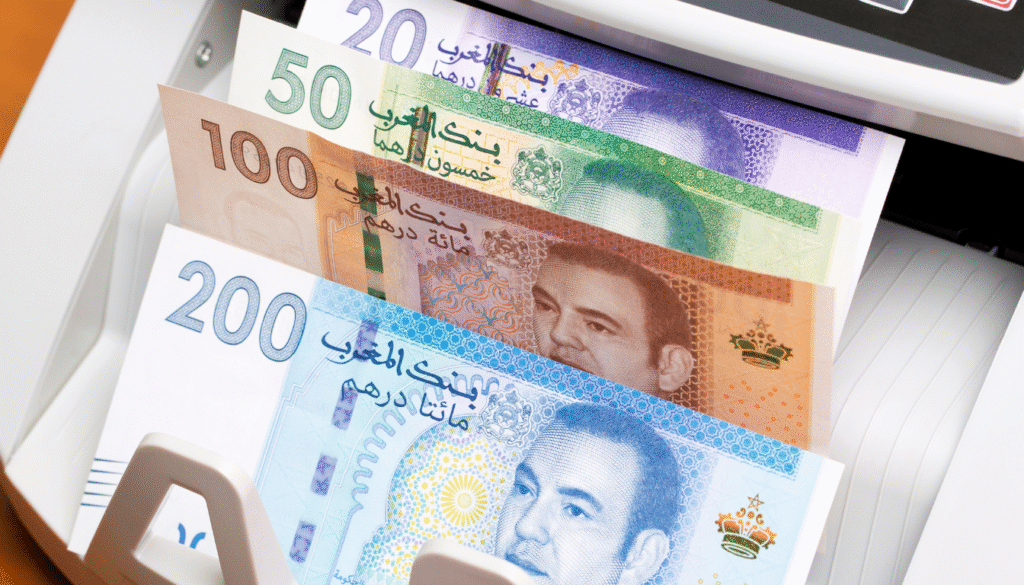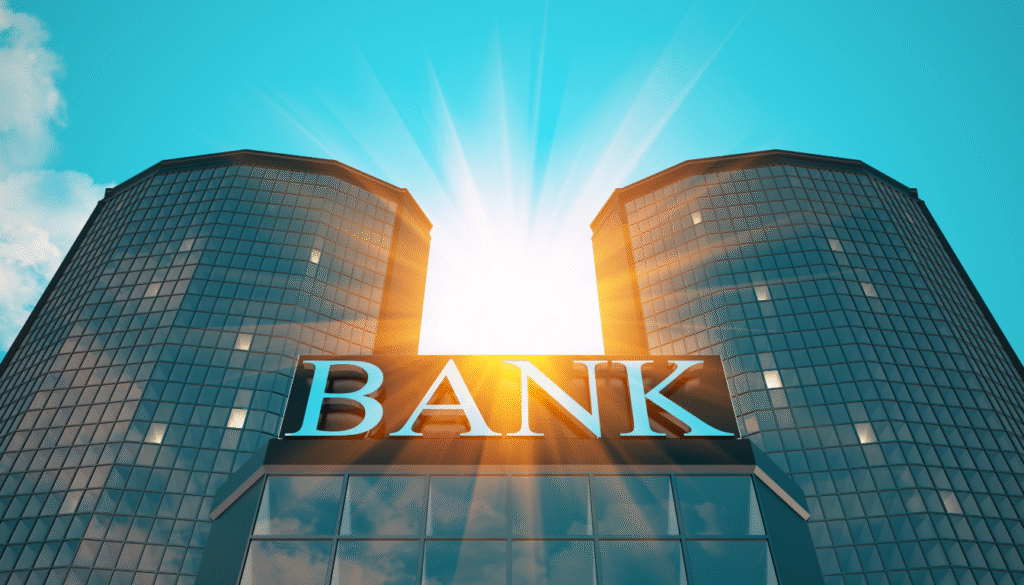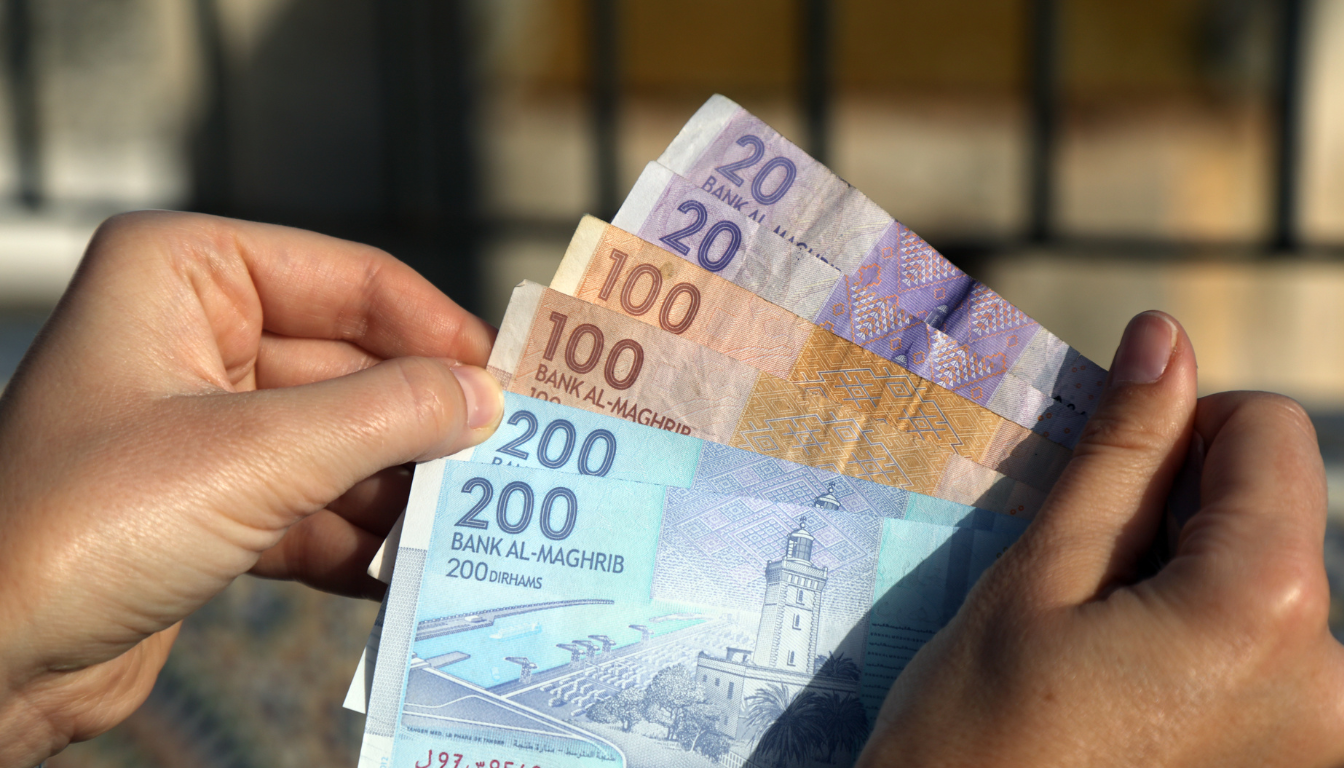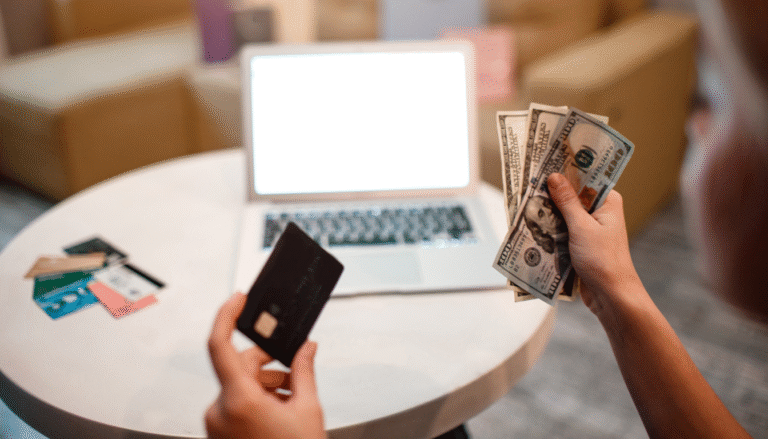Using Money in Morocco: A Traveler’s Guide
Planning a trip to Morocco? Knowing about the Moroccan dirham is key for a smooth trip. The dirham is Morocco’s official currency. Learning about it will make your travels easier.
You’ll see different dirham coins and banknotes. Knowing them will help with daily transactions. The Moroccan dirham has a rich history. Understanding its significance can enrich your travel experience.
Before you go, learn about currency exchange in Morocco. This will help you get the best exchange rates.
Understanding the Moroccan Dirham
Getting ready for your trip to Morocco? Knowing about the dirham is key for a smooth trip. The dirham is Morocco’s official currency. Knowing it will make handling money easier.
The Basics of Morocco’s Currency
The Moroccan dirham breaks down into 100 centimes. You’ll see coins in ½, 1, 2, 5, and 10 dirham values. Banknotes come in 20, 50, 100, and 200 dirham amounts. Knowing these values helps avoid confusion when you buy things.
History of the Dirham
The dirham’s history in Morocco goes back to when the country gained independence. Learning about its past gives insight into Morocco’s economic growth. The dirham replaced the Moroccan franc, showing Morocco’s economic growth.
Current Exchange Value
The dirham’s value changes against the US dollar and euro. It’s smart to check the current rate before you go. This way, you get the most value for your money. Look up the latest rates online or on financial news sites.
Knowing the Moroccan dirham’s basics, like its history and current value, helps manage your money in Morocco.
Currency Exchange in Morocco: Best Practices
Traveling to Morocco means understanding currency exchange well. Morocco uses the dirham. Exchanging your money for dirhams is key for a smooth trip.
Exchange Rates and Where to Find the Best Deals
For the best rates, use ATMs over airport or hotel exchanges. ATMs are everywhere in Morocco and give better rates. Check online before you go to find the best deals.
Online Resources for Rate Tracking
Online tools like XE.com and OANDA.com track exchange rates. They help you plan your money exchange. Watch rate changes to exchange when it’s best.
Negotiating Exchange Rates
At currency offices or banks, rates might not always favor you. Be ready to negotiate for better rates, especially for big amounts. But, ATMs usually offer clear rates without negotiation.
Follow these tips for better currency exchange in Morocco. Whether using ATMs or banks, knowing about rates and fees helps. This way, you make the most of your money during your trip.
ATM Withdrawals in Morocco
Planning a trip to Morocco? Knowing how to use ATMs is key. They’re a great way to get the local currency, the Moroccan dirham.
Finding and Using ATMs in Moroccan Cities
ATMs are easy to find in big towns and cities. But, it’s safer to use those attached to banks.
ATM Availability by Region
In places like Marrakech, Fez, and Rabat, ATMs are everywhere. But, in smaller towns or rural areas, they might be scarce.
Bank-Specific ATM Networks
Some banks have their own ATM networks. These can offer better exchange rates or lower fees. Using an ATM from your bank can save you money.
Tips for Safe ATM Usage: Be careful when using ATMs, especially in crowded spots. Cover the keypad when typing your PIN. Also, steer clear of ATMs that look tampered with or are in isolated spots.
Learning how to use ATMs in Morocco makes your trip easier and less stressful.
Using Money in Morocco: Cash Cards
Planning your trip to Morocco? Knowing when to use cash versus cards is key. Morocco is mostly a cash-based economy. Credit and debit cards are accepted in some places, but local currency is essential, especially in rural areas.
When to Use Cash in Morocco
Cash is preferred in many Moroccan businesses. This includes traditional markets and small shops. Having local currency, the dirham, makes transactions easier.
Cash-Only Establishments
Smaller places like local eateries and street vendors often don’t take cards. In these cases, having enough dirhams is crucial. Remember, “cash is king” here.
Rural vs. Urban Areas
Card acceptance varies between urban and rural areas. In cities like Marrakech and Rabat, many businesses accept cards, especially in tourist spots. But in rural areas, cash is the only option. Travelers need to be ready for this difference.

A travel expert notes,
“Morocco is a country where cash and cards coexist, but cash is still the dominant form of payment.”
This advice means you should use cash for most transactions, especially outside big cities.
In summary, while cards are getting more accepted in Morocco, cash is still the main payment method. This is especially true in rural areas and traditional markets. Understanding when to use cash versus cards helps you navigate the local economy and enjoy your trip.
Budgeting for Your Moroccan Trip
Planning your Moroccan trip well is key. Morocco is quite affordable, with a daily budget of £40-£50 per person. Knowing the local costs helps you plan better.
Cost of Living and Typical Expenses
The cost of living in Morocco changes based on where you are. Cities like Marrakech and Casablanca are pricier than smaller towns.
Accommodation Costs
Accommodation costs a lot. You can find cheap riads or luxury hotels. Budget-friendly options usually cost £10-£30 per night.
Food and Transportation Expenses
Eating out in Morocco is tasty and cheap. Meals at souks or street food cost £3-£5. Transport costs vary; buses are under £1, while taxis and private transfers are more.
With smart planning, you can have a great time in Morocco without spending too much. Save for special experiences like desert tours or haggling at markets.
Money-saving tips include eating at local spots, using public transport, and avoiding tourist areas for shopping. With some planning, your trip can be both fun and budget-friendly.
Tipping Customs in Morocco
Tipping in Morocco is more than saying thank you. It’s a big part of the culture and helps the economy. Knowing how to tip shows respect and makes your trip better.
When and How Much to Tip
In Morocco, you should tip for many services. This includes hospitality, dining, and tours. For café waiters, a small tip of 1-2 dirhams is nice.
At restaurants, tip around 5-10 dirhams for great service. This shows you value their hard work.
Expected Tipping Percentages
For tour guides, a tip of 10-20 dirhams per day is common. This depends on how well they serve you. Hotel porters and spa staff also appreciate a few dirhams.
Regional Differences
Even though tipping customs are mostly the same, some places might have their own rules. In busy tourist spots, tips in euros or dollars are okay. But, dirhams are always welcome.
Knowing these tipping customs makes your trip to Morocco smoother. It shows you appreciate the great service you get.
Avoiding Money Scams and Theft in Morocco
Traveling to Morocco means being careful with your money. The country is rich in culture and markets, but scams and theft can happen. Stay alert to have a safe trip.
Common Currency Scams to Watch For
Knowing about scams can help you avoid trouble. Two big ones are short-changing and fake money.
Short-Changing Techniques
Scammers might take less money from you. This can happen when you exchange money or buy something. Always count your change carefully to make sure you get the right amount.
Counterfeit Money Warning Signs
Getting fake money is another risk. Learn about the current design and security features of Moroccan dirhams. Be careful with big notes, especially from street vendors or in crowded places.
To keep your money safe, use trusted currency exchange offices. Be careful with ATMs, especially at night or alone. Keeping valuables close and being aware of your surroundings helps prevent theft.
By staying informed and alert, you can avoid scams and have a better trip to Morocco.
Banking Hours and Services for Travelers
Traveling to Morocco? Knowing about banking hours and services can make your trip better. You’ll want to know how to get your money and do financial stuff easily.
Typical Banking Hours in Morocco
Morocco’s banks are well-organized. They usually work on weekdays.
Weekday Operations
Banks in Morocco open from Monday to Thursday at 8:30 AM. They close at 6:30 PM. On Fridays, they open from 8:30 AM to 12:00 PM and then from 2:00 PM to 4:00 PM. But, hours can change a bit based on the bank and where it is.
Holiday Closures
Banks in Morocco close on national and religious holidays. For example, they’re shut on Islamic holidays and national days like Independence Day.
Here’s a quick look at typical banking hours and holiday closures:
| Day | Hours |
|---|---|
| Monday to Thursday | 8:30 AM – 6:30 PM |
| Friday | 8:30 AM – 12:00 PM, 2:00 PM – 4:00 PM |
| Weekends & Holidays | Closed |

Knowing these banking hours and services helps you plan your money matters in Morocco. It makes your trip smoother.
Conclusion: Managing Your Money Confidently in Morocco
Understanding the Moroccan dirham is key to managing your money in Morocco. Knowing how to exchange currency, use ATMs, and tip is essential. This knowledge helps you budget effectively and enjoy your trip.
Using money in Morocco means knowing the local currency and customs. This article has given you the tools to handle money matters in Morocco. You’re now ready to exchange currency, use ATMs, and cards with confidence.
When planning your trip to Morocco, keep an eye on your spending. Tip correctly and watch out for scams. This way, you’ll have a worry-free and fun trip, making the most of Morocco’s vibrant culture.


